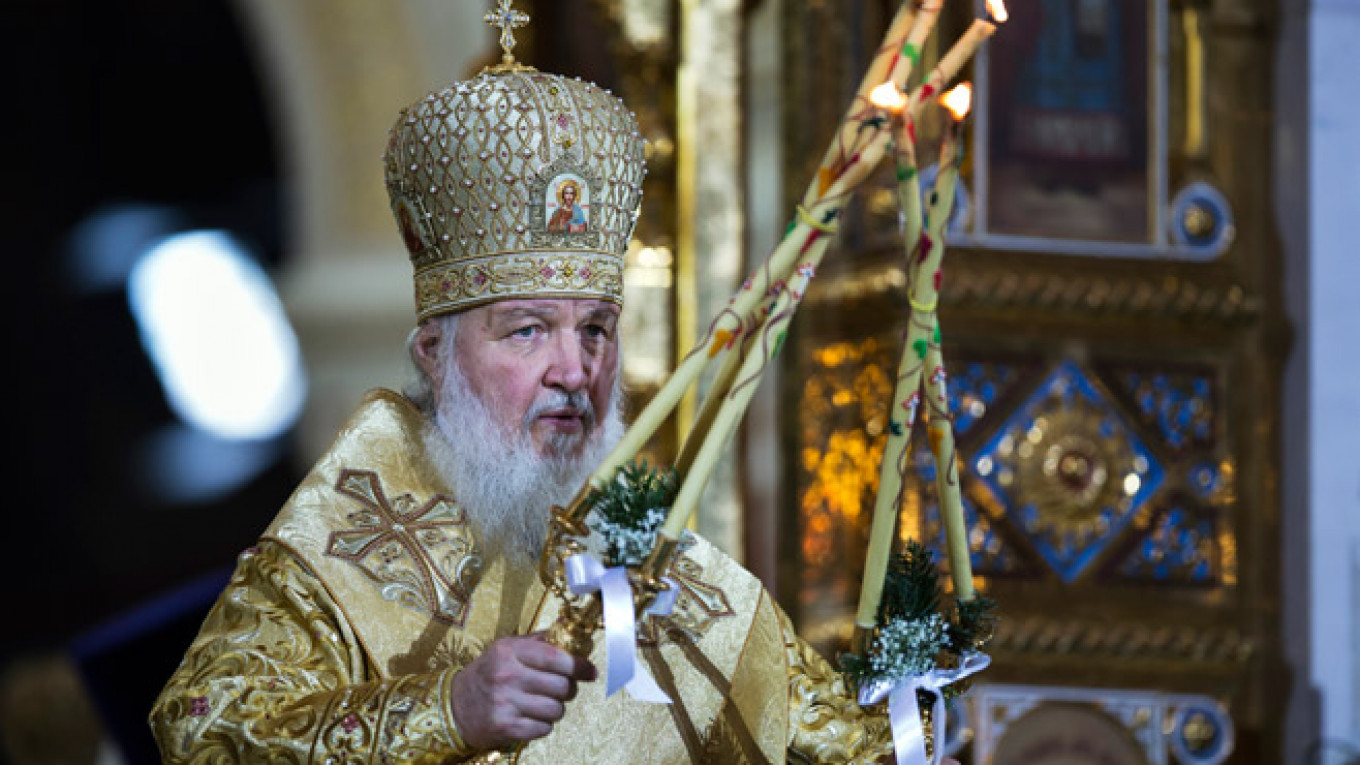Patriarch Kirill, head of the Russian Orthodox Church, crossed Russia's shifting line between Church and politics in his first-ever address to the State Duma on Thursday, calling on lawmakers to ensure that traditional moral values are safeguarded in the country's legislation.
The Russian Orthodox Church is known to entertain close relations with the Russian government, despite the Constitution stipulating the separation of Church and state. Patriarch Kirill supported President Vladimir Putin — calling his rule a "miracle from God" — during the last presidential campaign.
With relations with the West at their nadir, Kirill on Thursday reiterated the state's conservative stance on social relations, deploring Russia's high number of abortions and the practice of surrogate motherhood. He also presented the country's federal lawmakers as the gatekeepers to "moral" legislation.
"The political sphere is secondary. The sphere of values is primary," the Patriarch said, according to the Interfax news agency. "No Russian political party should destroy these primary values because [if one does], there will be no Russia."
Kirill added that the current composition of the Duma "implements on a practical level" the duty of protecting the country against "modern pseudo-values that are an offense to the identity and humanity of civilization as a whole."
"Examples of these [modern pseudo-values] are well-known: the legalization of same-sex unions, the legalization of euthanasia and the introduction of dangerous elements of the justice system into society," he was quoted by the RBC news agency as saying.
The Duma has indeed approved legislation that reflects the Patriarch's message. In 2013, the legislative body overwhelmingly supported a law banning the "propaganda of nontraditional sexual relations among minors," which activists say has stigmatized the country's LGBT community, eroded its rights and freedoms and led to a rise in hate crime.
That same year, federal lawmakers also voted to criminalize "insulting the feelings of religious believers." Backed by the Russian political establishment and the Orthodox Church, the law came in the aftermath of protest group Pussy Riot's performance of a "punk prayer" at Moscow's Christ the Savior Cathedral in February 2012 denouncing the collusion between church and state.
In his address, the Patriarch also proposed that abortions should no longer be covered by state medical insurance, which he said was "supported by taxpayers, some of whom are categorically opposed to abortion."
"One of Russia's main misfortunes is the high number of abortions," Kirill was cited by Interfax as saying. "If the number of abortions was halved, we would have steady and strong demographic growth."
In 2010, 1.2 million abortions were carried out in Russia, according to the federal state statistics service. A decade earlier, in 2000, 2.1 million abortions were performed throughout the country.
The Patriarch said that financial difficulties and the influence of family members and doctors were factors in women having terminations. The Patriarch also lambasted the practice of surrogate motherhood, which he said was meddling with God's plans for man and "turned children and women into objects of commercial and non-commercial transactions," according to Interfax.
Kirill also called for the revival of the Cossacks, a quasi-militant group found predominantly in Russia and Ukraine, for the return of the "solidarity" of the Soviet era to modern Russia and for increased funding for Orthodox religious schools.
Contact the author at g.tetraultfarber@imedia.ru
A Message from The Moscow Times:
Dear readers,
We are facing unprecedented challenges. Russia's Prosecutor General's Office has designated The Moscow Times as an "undesirable" organization, criminalizing our work and putting our staff at risk of prosecution. This follows our earlier unjust labeling as a "foreign agent."
These actions are direct attempts to silence independent journalism in Russia. The authorities claim our work "discredits the decisions of the Russian leadership." We see things differently: we strive to provide accurate, unbiased reporting on Russia.
We, the journalists of The Moscow Times, refuse to be silenced. But to continue our work, we need your help.
Your support, no matter how small, makes a world of difference. If you can, please support us monthly starting from just $2. It's quick to set up, and every contribution makes a significant impact.
By supporting The Moscow Times, you're defending open, independent journalism in the face of repression. Thank you for standing with us.
Remind me later.


